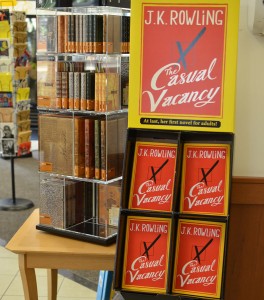Casual Vacancy handles mature themes
With her latest novel, The Casual Vacancy, J.K. Rowling proves that there is more than one kind of magic.
Though hippogriffs, wands and talking snakes don’t make appearances in the book, Rowling enchants her readers with a sophisticated yet subtle narrative, where tragedy and heartbreak largely influence the lives of each of her characters.

Mature material · J.K. Rowling’s The Casual Vacancy, now available at the USC bookstore, illustrates her departure from young adult fiction. – Christine Yoo | Daily Trojan
The Casual Vacancy begins with the sudden death of beloved citizen Barry Fairbrother — an event that ignites the entire novel. As the residents of Pagford reflect on Barry’s significance in their own lives, they immediately descend like carrion birds onto the empty council seat, each citizen believing that he is most capable of filling Barry’s rather large shoes.
You soon realize, however, that this is not just a novel about politics or arrogance. Instead, themes of heroism, adolescence and revenge quickly come into play, making The Casual Vacancy a reflection on the grim realities of life.
There are no Harry Potter-esque divisions of right and wrong here. If Harry and Voldemort are mortal enemies clearly standing on opposite sides of the good-versus-evil battle, the citizens of Pagford erase all possibilities of defining morality. Just when the reader prepares to pass judgment on a character, Rowling reveals an insightful backstory or allows the reader a glimpse into the individual’s most vulnerable thoughts, making her characters complex and unbelievably human — if difficult to categorize.
There is the hyper-sexual Krystal Weedon, who bullies and tortures her classmates but affectionately protects her younger brother, Robbie, from their heroin-addicted mother. There is also Stuart “Fats” Wall, a respected social insider obsessed with “authenticity” who is forced to confront his somewhat questionable motivations.
With an array of characters ranging from victims of self-abuse to youth-obsessed housewives, Rowling proves that human nature is alternately flawed and admirable. In fact, the only person in the novel who seems consistently good is Barry — but then again, the reader is never privy to his thoughts.
That being said, however, The Casual Vacancy is not for the faint of heart. If anyone thought Rowling was too grounded in children’s fiction to handle darker themes, her latest novel puts those doubts to rest. Rowling’s characters intentionally ruin one another’s lives and remain wrapped up in their own selfish desires as they plod through their own miserable existences. Optimism exists in The Casual Vacancy, but it rarely appears.
Foul language, graphic depictions of violence and detailed sexual exploits are as commonplace as nouns in Rowling’s latest. Some critics have even condemned the novel for these mature elements. Rowling, they argue, should have remained mindful of her young adult fanbase before creating a book filled with such explicit content.
But truth be told, Rowling is more than capable of handling herself in this new territory. The Casual Vacancy might be a bit strong for those under the age of 18, but Rowling refrains from any sexual or violent excess found in the likes of 50 Shades of Grey or even A Clockwork Orange. Any descriptions of “miraculously unguarded vaginas” or lips swollen like “tangerine segments” exist only to provide insight into a character’s innermost thoughts and motivations. If anyone found Harry’s toned-down lust for Ginny Weasley in the Potter series unrealistic, they’ll find little to complain about here.
Most notable in The Casual Vacancy is Rowling’s ability to conjure up detailed images in the reader. A student sits “cocooned in concentration.” A demure nurse gazes out “at the abbey across the valley, stark and skeletal against the pale pink and gray sky.” A scorned lover feels “painfully alive to what she had risked in overthrowing her life for the man walking away into the night with another woman.”
Early Rowling fans might recall particularly well-crafted Harry Potter phrases like descriptions of Uncle Vernon “galumphing out of the living room,” but The Casual Vacancy shows a more mature author, one concerned with the finer details of English prose. Even if some might want to skim past the cringe-worthy passages on Simon Price’s violent exploits, Rowling’s incredibly elegant style refuses to be ignored.
If there is a flaw in the novel, it arises from an overabundance of characters. The first few chapters of The Casual Vacancy might seem a bit convoluted as Rowling unleashes a torrent of characters in order to capture every initial reaction to Barry’s death. Here, keeping up with character names feels impossible.
But Rowling seems aware of this. She always makes sure to refer to her characters by their full names at the beginning of each chapter — just in case the reader forgot the specifics of their involvement in the novel’s plot.
Though The Casual Vacancy represents a departure from the magical fare of Harry Potter, the novel stands on its own as a solid piece of modern literature. With both grand dramatic turns and more subtle, nuanced emotional scenes, Rowling’s latest work stands as a satisfactory follow-up to her widely successful fantasy series. And though the book’s darker subject matter might alienate old Rowling fans, hopefully her newly channeled energies will also bring her new ones.
At any rate, Rowling proves she’s got the chops to tackle writing about the Muggle world as she embarks on the next chapter of her literary career.
